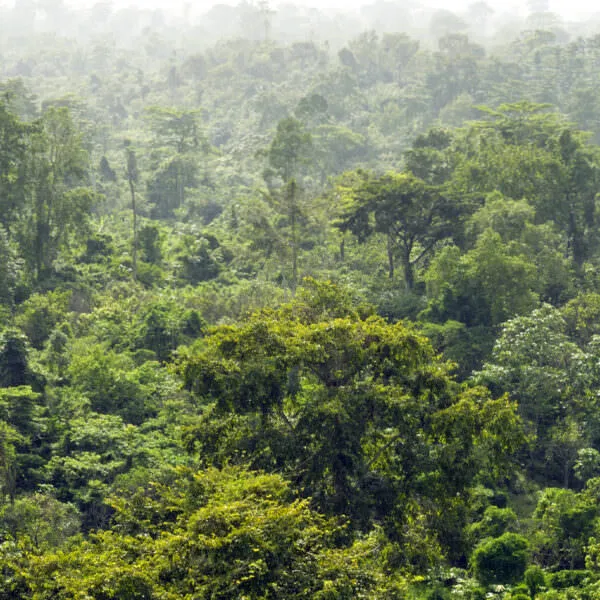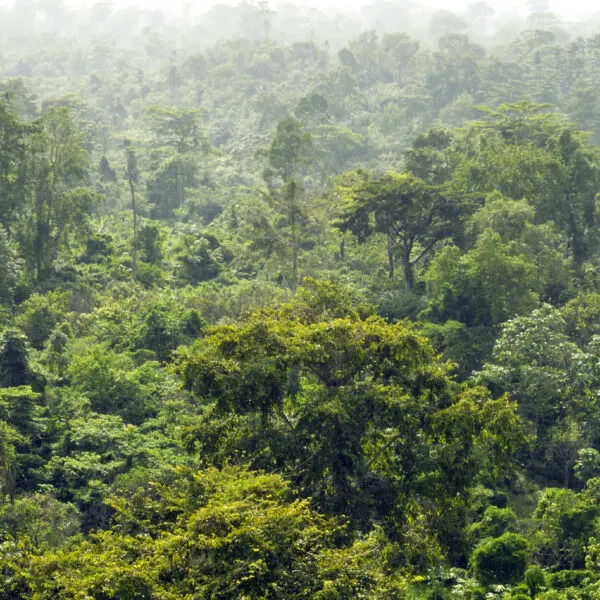Women are the backbone of Cameroon’s natural resource-based economy—playing a critical role in both crop and livestock farming, as well as the processing of forest products. Despite this, women are routinely excluded from decision-making processes that directly affect their livelihoods. Here’s how community landscape management can ensure that women get their rightful seat at the table.
Studies repeatedly show that the advancement of women’s rights is critical to the sustainable transformation of rural economies. Closing the gender gap—through equal access to education, financing, land rights, and training in sustainable land management practices—not only improves the lives of rural women, but also brings wider benefits for the whole community and surrounding landscapes—including higher agricultural yields on existing farmland, better incomes, and healthier landscapes.
Nevertheless, women are still significantly under-represented across the board—from rural businesses and community representation bodies to civil society organizations. Unless targeted actions are taken to promote their participation in sustainable development initiatives, women will continue to be excluded.
That’s why this project, together with its sister-project “Championing community-led landscape management in Cameroon” prioritizes efforts to promote women as community leaders and champions of sustainability.
Location
Cameroon: Mount Bamboutos, Western Highlands
Period
2020-2023
Partner communities
This initiative will serve 3,000 people, including 1,500 women, across Mount Bamboutos who depend on natural resources for their livelihoods. Specifically, the project will work directly with:
- 250 women and young people (at least 80 percent women) involved in agricultural production at the community level
- 50 women from five women-led local enterprises (where women occupy at least 50 percent of management roles) that process farming/forest products or renewable biofuels
- Ten Community Based Organizations (CBO) and five Civil Society Organizations (CSOs), including SAPED and ACREST
Project objectives: Women as sustainability champions
The main objective of this project is to strengthen the economic and social rights of women and youth (particularly young women) in Mount Bamboutos through the promotion of community-based and environmentally sustainable landscape management.
Working closely with local communities and our frontline project partners, ACREST and SAPED (see below), the Rainforest Alliance aims to:
- Ensure full participation and equal leadership opportunities for women at all levels of decision-making in local Landscape Management Boards (LMB) and other community-based organizations
- Improve the technical skills and boost the productivity of women-led local enterprises, with an emphasis on sustainable farming, non-timber forests products, and renewable energy solutions
Desired impacts: Strong women, strong communities, strong landscapes
The over-arching goal of this project is to improve the land rights and decision-making power of rural women across Mount Bamboutos—leading to higher yields and better incomes for both women and the wider community.
To that end, the project will work to achieve the following outcomes:
- Strong women’s representation in community-based landscape management
A community-based Landscape Management Board (LMB) will be established—involving relevant stakeholders from multiple sectors—with the role of ensuring that collaborative, gender-sensitive, and informed decision-making processes are observed at the local level. Members will be trained in gender equality issues and how to take affirmative action against discrimination. The goal is ensure that at least 30 percent of the LMB’s members are women, who will receive additional skills training to ensure maximum representation. - Better economic opportunities for women in local businesses
At least five women-led local enterprises will be established. Participants will be trained in more sustainable processing techniques to improve the quality and market value of local agricultural and forest products such as avocado, honey, spices, and poultry. This, in turn, will help generate economic opportunities for a further 250 adult women and young people (80 percent women) involved in local agricultural production.The project will also train selected youth participants in the production of renewable energy solutions, such as biochar fuel (made from agricultural waste), solar dryers, and more energy-efficient cookstoves.
- Greater awareness of gender issues at both a local and national level
By the end of the project, key local and national stakeholders will demonstrate improved awareness of women’s social and economic rights and will recognize the pivotal role of women and youth in community-based landscape management—and the added benefits such inclusion brings to the wider community.
Funders
The funders for this project—full name “Strengthening the economic and social rights of women through engagement in community-based and environmentally sustainable landscape management” are:
- The European Commission
- Global Environment Facility (GEF) through the United Nations Environment Program (UNEP) project “Removing barriers to biodiversity conservation, land restoration, and sustainable forest management through Community-Based Landscape Management.”
Partner organizations
Association pour les Services d’Appui à la Protection de l’Environnement et au Développement (SAPED)
African Center for Renewable Energies and Sustainable Technologies (ACREST)
Rainforest Alliance contact
Nadège Nzoyem, Central Africa director
nnzoyem@ra.org




